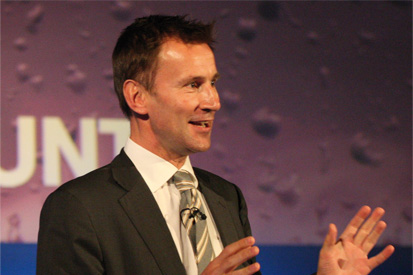
After six weeks at the Department for Culture, Media and Sport (DCMS), Jeremy Hunt reaffirmed his desire to transform the local media landscape.
In a speech earlier this month, he sketched out the government's vision of a society that 'gives communities greater control over their destinies'. He went on to say: 'For this to happen, we need strong local media to nurture local identity and hold locally elected politicians to account.'
According to Hunt, the UK's current legal framework governing local media, which is overseen by Ofcom, is not geared up to encourage this, so he wants to unleash 'hungry, ambitious and profitable local companies' by shaking up its regulation.
In his speech, he endorsed Ofcom's 2009 recommendations on cross-media ownership rules; these would mean more freedom for local newspapers to consolidate with local radio stations.
At the same time, Hunt plans to settle 'once and for all what needs to change to make local broadcasting viable in the UK' and revealed that he had asked Nicholas Shott, head of UK investment banking at Lazard, to review the potential for local television stations.
Looking Stateside
This is where Hunt's agenda might come unstuck. For some time, he has argued that the UK should replicate the US, which has numerous local TV channels. Yet, one media analyst is not persuaded the model is transferable, nor that there is real demand for it. 'The US has a genuinely big-scale local TV market, whereas it's hard to see a UK model outside a couple of cities - certainly not the 40 locations the government has talked about,' he says.
Local press trade body The Newspaper Society is also sceptical. Its members have long advocated relaxing cross-media rules, but Trinity Mirror chief executive Sly Bailey sums up the attitude to city TV when she says: 'We don't see it as a viable proposition. Our research suggests the costs are too high and revenues too low to support a business.'
Bailey's scepticism is underpinned by the losses Associated Newspapers made on its London-based Channel One news service and the problems faced by Channel M, The Guardian Media Group's (GMG) local TV service in Manchester. Indeed, Trinity Mirror had the chance to buy Channel M earlier this year when it acquired GMG's regional media division for £44.8m. The fact that it did not is telling.
Matt Payton, head of policy at commercial radio trade body RadioCentre, also welcomes Hunt's position on deregulation, but argues that the case for local TV is unproven. 'We await the review with interest, but ad revenue is sparse and there is a shortage of talent to deliver the quality of service (Hunt) envisages,' he says. 'I suspect government will end up with a less ambitious model once it explores this area in detail.'
However, Ed Hall, chief executive of TV management company Canis Media can envisage city channels, providing key conditions are met. 'Relaxing cross-media regulation is a good start, but BARB doesn't measure audiences on small channels well, so the DCMS would have to look at that,' he says. 'Because of the costs involved, companies would probably need government incentives to encourage investment and would find DTT a cheaper option than Sky. To be viable they'd also need to run at least six of these city operations to really maximise the economies of scale.'
Online TV offers a possible low-cost alternative, which would allow a centralised digital architecture to support local services. Iolo Jones, chief executive of internet TV group TV Everywhere, says: 'There have been several local initiatives online. Perhaps the most ambitious was ITV Local - a national network of local online channels. Some of the ideas, such as video classified advertising, were very innovative.'
Jones remains convinced that local TV online can work, but admits that building an audience and making a profit from the platform are difficult. 'One problem is producing ads for local businesses, because this can be expensive,' he says. 'That said, on TV Everywhere's VidZapper platform we have a successful channel in Seville, which combines social features with a TV feed and drops in targeted advertising.'
Judging by its less-than-glowing reception from media industry figures, Hunt's plan for local TV services, will be far from easy to achieve. Shott's conclusions, expected in a few months' time, will be read with interest.
- £1.7bn - Regional press ad revenues in 2009, following a steady decline from £3bn in 2004
- 35.8% - Drop in online recruitment adspend in 2009 (from £89.2m to £55.6m)
- 26.2% - Decline in regional press print advertising in 2009
- £35.9m - Local radio ad revenues in Q1 of 2010, compared with £39.4m in Q1 of 2007
Sources: The Newspaper Society, RAB

